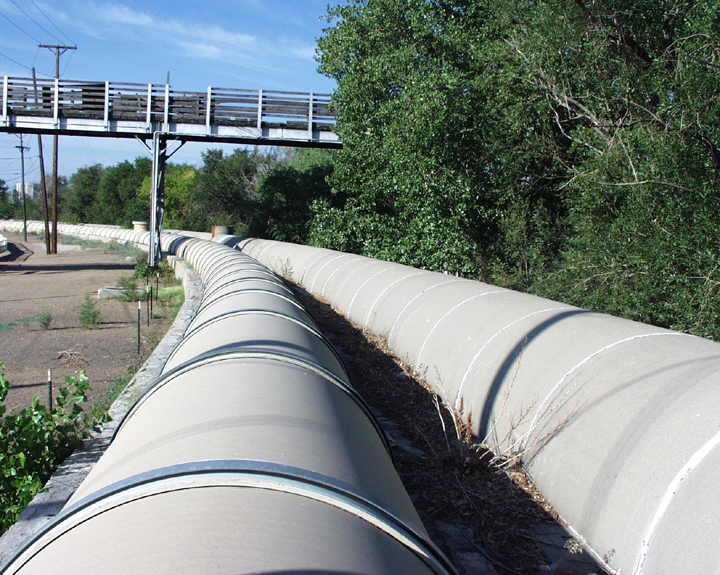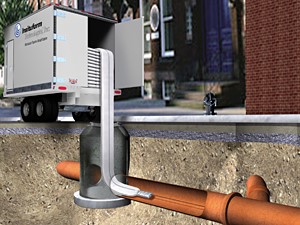Metro Water Recovery is routinely working to improve our infrastructure. Here are our ongoing projects:
Second Creek Pipeline
The Second Creek Pipeline is new infrastructure, approximately 17 miles long, to be constructed by Metro Water Recovery. This new pipeline will enable portions of Adams County, Aurora, Brighton, Commerce City, Denver, and Denver International Airport to be served by Metro’s Northern Treatment Plant.
These partner agencies worked with Metro to develop the Second Creek Basin Regional Master Plan. This collaborative effort identified the Second Creek Pipeline and its First Creek Segment as the best long-term solution to address rapid regional growth and better connect Metro’s system with the 2.2 million Coloradans it serves.
Additional benefits of this gravity-powered pipeline may include:
- Closing up to five existing pump stations
- Reducing energy use and carbon footprint
- Reducing long-term maintenance and operating costs
Project Schedule

Pipeline Route


Contact Us
Contact us with questions regarding the Second Creek Project.
(303) 286-3115 (English)
(303) 286-3116 (Spanish)
Or email the project team at SecondCreek@MetroWaterRecovery.com
What Is the Aurora Interceptor Rehabilitation Project?
The Aurora Westside Interceptor Rehabilitation project is necessary to maintain approximately 23,000 feet of pipeline that runs from Parker Road and I-225 to Dayton Street and Smith Street.
The construction method (known as “cured in place pipe or CIPP”) allows work to be completed within a relatively small footprint by installing a liner into a pipe, pressurizing the liner, and then heat curing the liner to become a pipe within a pipe. However, CIPP installation cannot be performed during live flow conditions and requires temporary above-ground bypass pumping. Short-term road closures and/or traffic detours will be required along the route.
Metro is committed to completing this routine maintenance project safely and efficiently with minimal disturbance to local businesses, residents, and visitors.
What to Expect During Construction
Safe and secure worksites: Measures to reduce odor, noise, and traffic impacts


Current/Upcoming Work Areas
Contact Us
Contact us with questions regarding the Aurora Westside Interceptor Rehabilitation Project
Myles Howard · Project Manager
720-703-3627
Kelley Merritt · Public Information Officer
303-877-0474
What is the Electrical Transmission Service Substation?
Metro Water Recovery serves some 2.2 million Coloradans, and its Robert W. Hite Treatment Facility (RWHTF) reclaims about 130 million gallons of water every day. To improve reliability of this essential water infrastructure, a new electrical substation is being designed at the RWHTF. The project will minimize power outages and related facility shutdowns, as well as provide additional capacity required for future operations and regulatory changes to continuously improve regional air and water quality.
The project will result in a more resilient, dependable, and cost-effective power supply for the region’s essential water infrastructure.
Existing System Challenges
- Electrical grid reliability: Roughly 15 power outages per year
- Aging infrastructure: More frequent future power outages
- Limited capacity: Limited ability to expand existing grid
- High electricity costs: Metro is one of the largest single users on existing grid
Project Benefits
- Improved reliability: Redundant system with virtually no interruptions
- Long-term solution: Required for future operations and regulatory changes
- Increased capacity: Increases ability to improve regional air and water quality
- Reduced costs: Savings of roughly $725,000 in annual energy costs
About the Project Site
- Owned by Metro (23.4 acres with 4.4 acres for anticipated project site)
- Located in unincorporated Adams County
- Undeveloped and un-platted property (A-1 Zoning)
- Located within 100-year floodplain (requires mitigation)
- Close proximity to existing Xcel transmission line

Resources and Documents
Questions?
- Contact Metro Water Recovery Project Manager: Ben Ruder
- PublicInfo@MetroWaterRecovery.com
- (303) 877-0474

